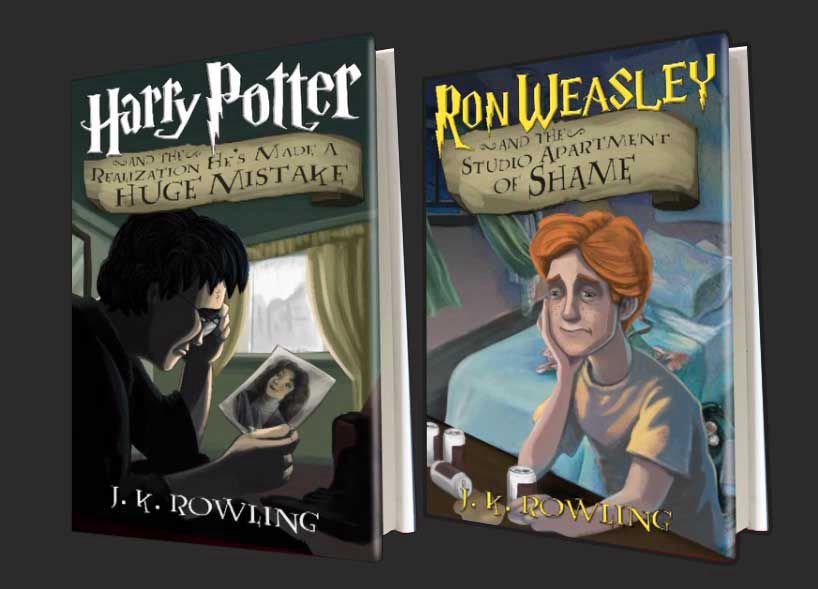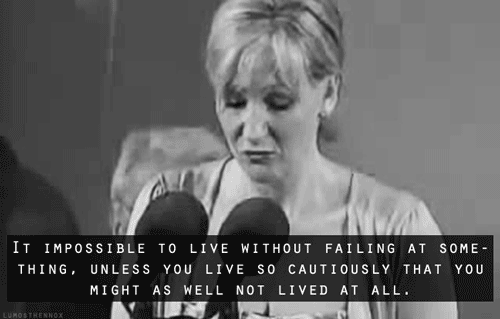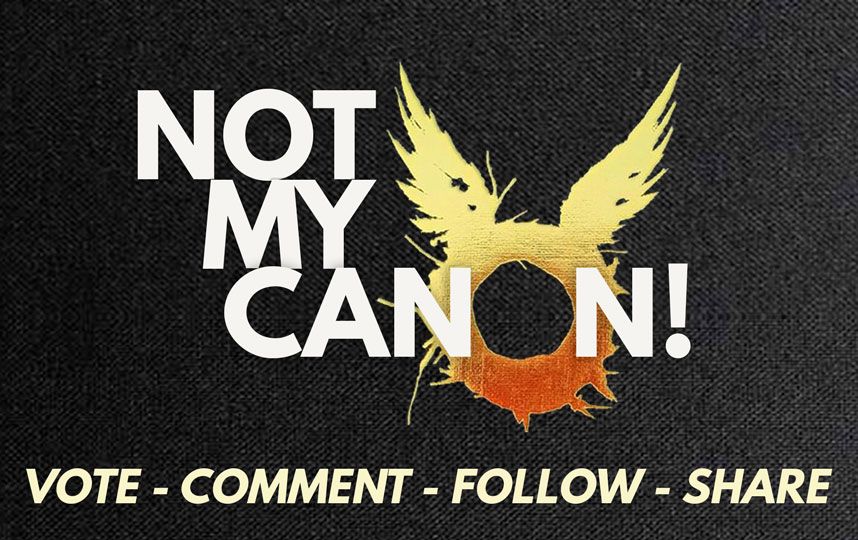The Teflon Dress
Another famous Harry, American President Harry S. Truman, had a small sign sitting on his desk that read "The Buck Stops Here". It was a constant reminder that he, alone, was ultimately responsible for every decision made under his presidency. Truman never allowed himself to delegate that ownership to the leaders under him. The same goes for J.K. Rowling. The success or failure of HARRY POTTER AND THE CURSED CHILD, while a product of many voices, ideas, and performances, fundamentally rests with Rowling.
The buck stops with her.
Therefore, while many of us may want to call JKR the villain of this disaster, the rest of the case I'm going to lay out comes more to her defense. I'm going to "pass the buck" for the next couple posts.

At the beginning, J.K. Rowling would exhibit those tell-tale signs of a silent writer, like when she first joined Twitter. It was adorable and everything you wanted out of a famous author, who occasionally peeked out of the shadows to wink at you, before scurrying back into her little hole (that you just KNEW had a kettle of steaming tea whistling on the stove) to write intriguing stories that you were eager to read. Now, like many of our parents and grandparents, who tend to overshare with a touch of contempt on social media, she often leans into her Grangeresque, insufferable know-it-allism. Slightly less cute, but at times hilarious and emblematic of someone who could create both Harry Potter and Peeves the Poltergeist.

But I think if you took away the tweets and boiled her actions down to their essence, you would find a people-pleaser. As an author, JKR wanted to tell us a story. She found a connection between the characters of her mind and the people of the world. Ultimately, this drove her to want this connection to deepen. And it did, far beyond the bounds of her imagination.
"I never set out to build a big community, but I don't think there is a writer alive who wouldn't want to have that many people react to their work. That's what happened. People came inside the world with me."
Once that bond was created, she was surprised to find that her fans were beginning to imagine her world on their own through fanfiction. In fact, I'd go so far as to say that she didn't know that sort of interaction even existed in the fandom until she was a few books in.
On a quiet Tuesday night in August 2006, J.K. Rowling headlined a charity event with a reading from her book HARRY POTTER AND THE HALF-BLOOD PRINCE, still warm from the printing press.

There was something magical about her that night. You can see it in the clips on YouTube. Almost an innocence that still remained. She had one more book to write, and it had been a year since Goblet of Fire had rocked theaters. JKR had never been so popular. This is the year when the critics had determined that the movies would not out-pace her (as the Game of Thrones series has done to GRRM) and that Harry still had a lot of trials left to endure. And so, Radio City Music Hall was packed. Not to hear guitars, but words, as Stephen King had noted.
During the interview portion of the night, JKR showed us her sweet naivety when it came to her own fandom. Particularly the relationships her fans were dreaming up between her characters.
"People used to say to me, 'Do you ever look at the fan sites or see what people have said online?' I was truthful. I said I didn't. Then one bored afternoon, I googled 'Harry Potter'. Oh... my... God... I had NO idea. The shipping wars? (crowd screams). For people who are over 18 who may not know about this - because I certainly didn't - it's like cyber gang warfare. People who wanted Harry and Hermione to end up together... (crowd screams again) They're still out there! Get over it!"
Did you see that? It might have happened too quickly, so I'll slow it down. JKR just admitted, in the heat of promotions for Book 6 and in the development of Book 7 that she could never have imagined putting Harry and Hermione together. But the fans wanted it. At least some fans did. And they were so adamant about their hopes that she heard them. Which is why I believe her focus on that minority as a significant element of her fanbase drove her to express the thoughts she did, when sharing the interview stage with Emma Watson eight years later. When she claimed that Hermione should have been with Harry and that the relationship with Ron was nothing but personal wish fulfillment.
Why? Why did she say this long after the series was complete in both print and film? Why did she back down from a decision she had made?
Because she's a people-pleaser.
She felt that her fans wanted it, and so she changed her own views to please them, without realizing that she was only addressing a very vocal minority. She likely didn't know how shocking this would be to the rest of us, because the perception of her own fans was localized to biased Tumblr pages and fan sites.
Stephen Colbert mocked the statement on his shwo by releasing fake covers for future books: HARRY POTTER AND THE REALIZATION HE'S MADE A HUGE MISTAKE and RON WEASLEY AND THE STUDIO APARTMENT OF SHAME.

So, why am I discussing this in the retrospective of the Cursed Child play? Because you need to wonder if she felt the same drive to make the overly popularized ship of Voldemort x Bellatrix on fic sites a reality, believing that fans would absolutely love it.
See... something in her changed between then and now, between her innocent joy in bringing us Potter and the "I don't think so, Will" BBC interview before the play premiered. JKR moved from a confident but silent belief that she knew her characters better than anyone else, to a fearful state that she did not. A state that was over-confident in its defense, to the point of belligerence. I think some of that hardening has happened because of an inner struggle to balance the desire to please people, and the eventual compromise of her own ideas, leading to regret. So a tough shell was built, a Teflon-like Patronus, to protect her. And yet, when she saw someone of a similar countenance, Jack Thorne, who confessed to also feeling happier in a room alone, JKR put her wand away. Her respect for his abilities as a playwright and his claim of Potterhead status, combined with her admittedly tenuous grasp of her own canon, allowed his ideas to shine forth, even when they contradicted her own.
JKR trusted Jack Thorne's perspective on her canon for the same reason she took the word of an article writer from the Harry Potter Alliance that Hermione was racially ambiguous in the books.

This may feel like a change in topic, but hear me out. In the summer of 1983, a representative of Colorado, Patricia Schroeder, addressed Congress to come out against American President Ronald Reagan, who was seen to be brushing off credit for his mistakes. "Harry Truman had a sign on his desk emblazoned with his motto: 'The Buck Stops Here.' It has obviously been removed and Reagan's desk has been Teflon-coated..."
Teflon, as a nonstick frying pan, has two functions as a metaphor. The first being that no conflict can stick to you. You're dodgy. When facing criticism or controversy, you always come out clean. Without a scratch. The other metaphor is the image of being tough and durable. Bullet-proof. You have a thick outer shell that resists the wear and tear of others, which is how the Reagan administration spun the negative press at the time into the mantle of "the man in the Teflon suit". A metaphor that turned almost literal in the memory of his assassination attempt from two years prior.
On Twitter, JKR is considered to be a popular voice in the area of politics. TIME even named her one of the thirty most influential people on the internet. So it should come as no surprise that her metaphors run in similar circles. Back to that BBC interview with her co-writers for the play, JKR made a confident claim about herself.
"I had absolute trust in these guys, but you never know until it's done. You never know whether you have done the thing you set out to do. But when I woke up on Wednesday morning I thought, 'We're fine. It's going to be ok'. I feel quite Teflon now. I think we've done a great job and I think fans will love it."
By calling herself Teflon, JKR is stating that she is willing to take on the brunt of any criticism of the play, that time has made her strong enough to withstand any possible negativity. Also that she is fine with the buck stopping on her desk because fans will love it. But they didn't.
Let me end with one of her most famous, most widely shared quotes.
"It is impossible to live without failing at something, unless you live so cautiously that you might as well not have lived at all - in which case, you fail by default."

It is an inspirational sentiment. However, in the workings of JKR as a once tentative writer, it reveals the transformation she has made over so much time baking in the heat of the spotlight. She went from a person who was so worried about failing that she meticulously outlined her work (the world was real in her mind, and she was the guardian of its secrets, so sure of her characters that the shipping of her fans came as a shock), to a people-pleaser who was willing to compromise previous viewpoints, believing it no longer mattered if you failed. JKR has become almost proud of this change in her personality, as if failure was a shiny, Teflon-coated badge of honor. Percy, the Bighead Boy. And she brought this picture of herself into the development of the play script, because it's clear that they went into the writing with a dash of reckless abandon. And, as the saying goes: twice the pride, double the fall.
Mike, didn't you say you were coming to her defense? Passing the buck?
Yes. Stick with me.

Bạn đang đọc truyện trên: Truyen247.Pro